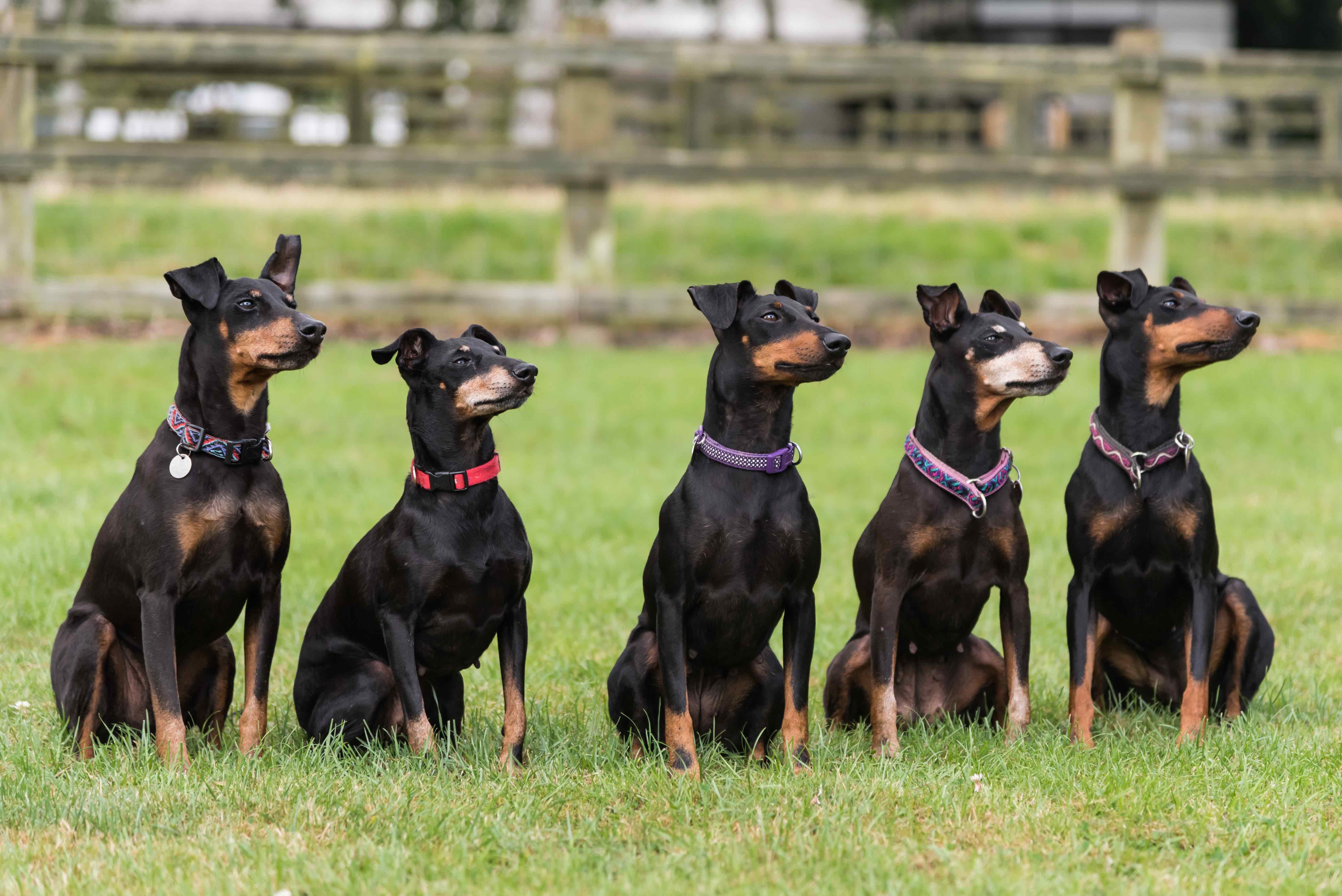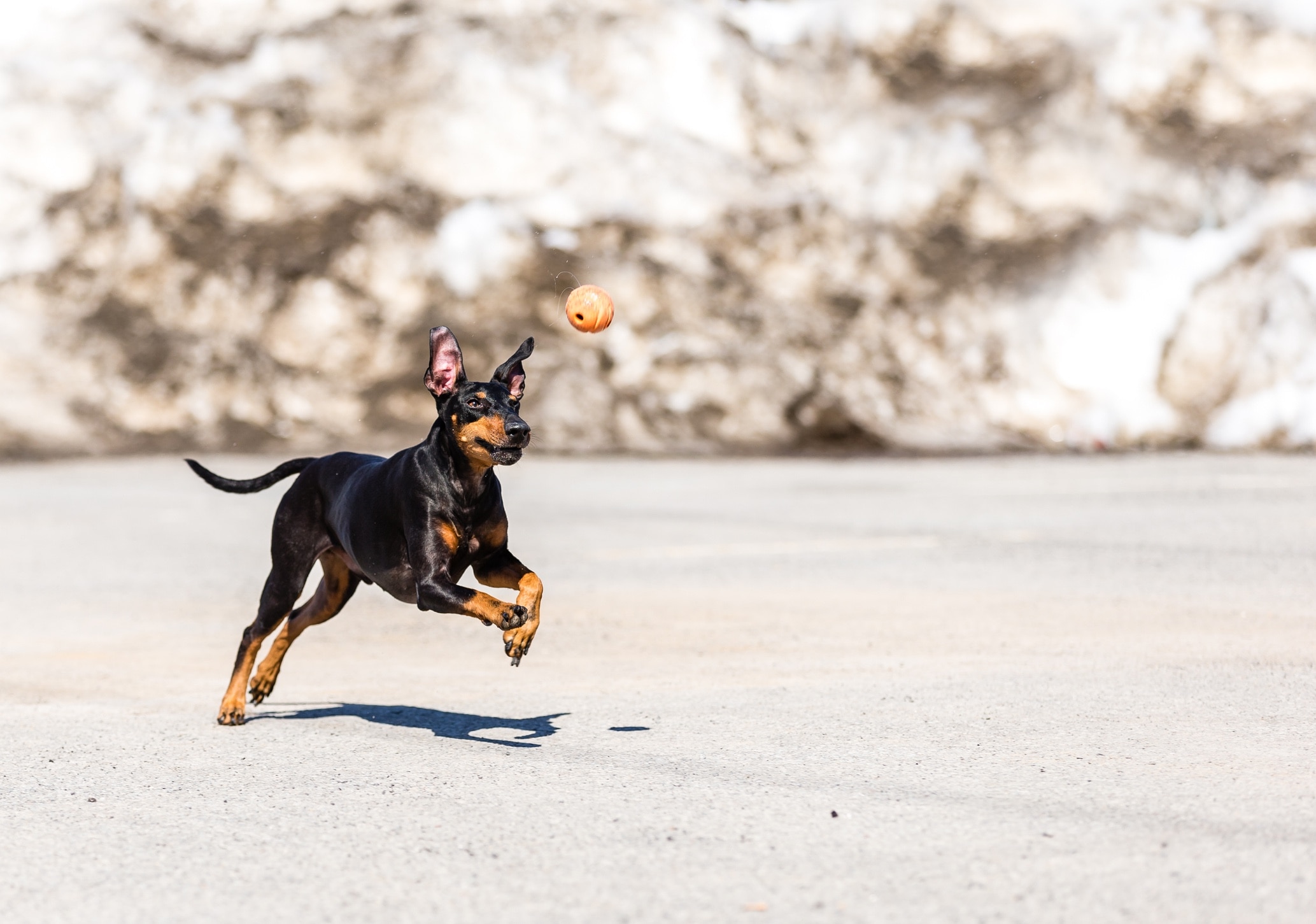Manchester Terrier
Dopeyden/iStock / Getty Images Plus via Getty Images
Manchester Terriers have ancient roots, tracing back to the 1570s in the Manchester district of England. As the oldest identifiable terrier breed, according to the American Manchester Terrier Club (AMTC), Manchesters were initially desired because of their skills as ratters and hunters. Today, they’re most commonly seen as family pets.
Caring for a Manchester Terrier
Loving and intelligent, Manchester Terriers are low-maintenance and mostly require the classic hallmarks of pet parenthood. The breed needs regular exercise every day, but once their energy is spent, they love to get cozy with their family members.
Manchester Terriers have a smooth, short coat that requires minimal upkeep. The breed can be prone to barking and digging behaviors thanks to their terrier nature, but some of these instincts can be managed with proper training and behavior modification. They can also have a high prey drive because of their history as ratters, so always supervise your dog when they’re outside so they don’t run off after a squirrel.
The standard Manchester Terrier size is 15–16 inches tall and 12–22 pounds. There’s also a smaller Toy Manchester Terrier, sometimes called a Miniature Manchester Terrier, which is considered a separate breed.
Manchester Terrier Health Issues

Manchester Terriers are considered a relatively healthy breed, according to the Canadian Manchester Terrier Club (CMTC). However, like all dogs, Manchester Terriers are predisposed to some health conditions. Pet insurance could be a good investment when you bring home a Manchester Terrier puppy.
Von Willebrand Disease
Von Willebrand disease (vWD) is a genetic blood disease that can lead to excessive bleeding after normal procedures or injuries. In severe cases, affected dogs can bleed spontaneously from their nose or mouth and may have uncontrollable bleeding after surgery. Spontaneous or unusual bleeding can also be noticed as bruising on the skin or gums.
Pet parents should be prepared to take precautions to avoid blood loss even after minor injuries, and affected dogs shouldn’t be given blood thinning medication, such as aspirin. A veterinarian can detect vWD with a blood test.
Hypothyroidism
Hypothyroidism happens when a dog’s body doesn’t produce enough thyroid hormone. The ailment can make it hard for a dog to maintain their metabolism and lead to other health problems.
Signs of hypothyroidism include:
-
Weight gain, despite no changes in diet or exercise
-
Heat-seeking behavior
-
Dry and brittle hair
Talk to your veterinarian if you notice any of these symptoms in your Manchester Terrier.
Primary Lens Luxation
Primary lens luxation occurs when the eye’s lens slips out of place. It can lead to cloudy, red, painful, and teary eyes, and can cause blindness if not treated early. Treatment includes surgically removing the lens or medication to reduce discomfort.
Alopecia
According to the CMTC, Manchester Terriers can develop alopecia and seasonal alopecia. Alopecia is characterized by hair loss around the temples, neck, chest, abdomen, and thighs. Seasonal alopecia typically develops on the flanks (the area reaching from the sides of the chest to the front of the legs).
Talk to your veterinarian if you have concerns about your dog’s coat or notice hair loss.
What To Feed a Manchester Terrier

Manchester Terrier dogs need a high-quality and age-appropriate diet. Puppies should eat puppy food, adults need adult food, and seniors can eat a diet specially formulated for older dogs. All food should meet the nutritional standards set by the Association of American Feed Control Officials (AAFCO).
Your veterinarian can help you choose the best food for your dog to ensure they get all necessary nutrients.
How To Feed a Manchester Terrier
Feed your Manchester Terrier twice a day: once in the morning and once in the evening. Manchester Terrier puppies can benefit from eating three smaller meals per day to prevent hypoglycemia (low blood sugar). Avoid free-feeding because this can lead to obesity, and always measure your dog’s food to the correct portions.
How Much Should You Feed a Manchester Terrier?
Talk to your veterinarian about how much to feed your dog. Your dog food packaging will provide guidelines based on your dog’s weight, but your vet can refine that to match your dog’s lifestyle and health.
Nutritional Tips for Manchester Terriers
Manchester Terriers eating an AAFCO-approved diet will receive all the necessary nutrients. However, your veterinarian may recommend specific supplements for your dog, such as fish oil or joint supplements, depending on their health.
Never give your dog a supplement without your veterinarian’s guidance.
Behavior and Training Tips for Manchester Terriers
Manchester Terrier Personality and Temperament

Manchester Terriers are deeply devoted to their family, according to the British Manchester Terrier Club (BMTC), but are more reserved around strangers. With early and consistent socialization, they can warm up around new people.
Manchesters also do well with children, especially when exposed to kids during puppyhood, and can get along with other dogs with the proper introductions. As an active breed, Manchester Terriers may have more energy than other calmer dog breeds. You might need to take your Manchester on a daily run to tire them out; the BMTC recommends 30–60 minutes of daily exercise for this breed.
Manchester Terrier Behavior
A true terrier, the Manchester is known for barking and digging. They might not bark excessively, according to the CMTC, but they may bark for your attention or to alert you to something. Consistent training can help reduce barking and other undesirable behaviors.
A Manchester Terrier’s digging behavior comes from their ancestral prey drive. Pet parents can minimize damage from digging by exercising and mentally stimulating their dog so they won’t be tempted to dig for entertainment.
Always keep your Manchester on a leash or inside a fenced space to help curb their prey drive. And because they may see smaller animals as something to chase, they might not be the best dog for homes with pocket pets, such as hamsters or gerbils.
Manchester Terrier Training
As smart dogs, Manchester Terriers are quick and eager learners. They thrive with positive reinforcement training and, once they master basic cues like “sit" and “stay,” can go on to learn more advanced tricks and skills, including agility.
Because they can be more reserved around new people, it’s important to socialize your Manchester Terrier puppy from the moment you bring them home. This helps them grow to be more comfortable and confident in new situations.
Fun Activities for Manchester Terriers
Manchester Terrier Grooming Guide
Because of their smooth and short coat, Manchester Terriers are relatively easy to groom and don’t require much upkeep.
Skin Care
Manchester Terriers can develop allergies, alopecia, and hypothyroidism (which can cause skin infections), so pay special attention to changes in their skin. Contact your vet if you notice redness, hair loss, increased itching, a thickening of the skin, or other skin-related symptoms.
Coat Care
The black and tan coat not only looks dapper, but it’s also easy to care for. According to the CMTC, Manchesters don’t often develop a doggie smell, and their thin coat means matting isn’t an issue.
Manchester Terriers shed regularly but not excessively. Brushing them once a week with a rubber curry brush or bristle brush will help keep shedding to a minimum.
Eye Care
Manchester Terriers need regular eye exams to screen for conditions, including primary lens luxation. Contact your vet if you notice changes in your dog’s eyes or vision.
Ear Care
It’s common to see Manchester Terriers with cropped ears, although the American Veterinary Medical Association advises against this cosmetic procedure. Uncropped Manchesters will have ears that fold over and flop.
Talk to your veterinarian about how and how often you should clean your dog’s ears. Always use a veterinarian-recommended ear cleaner and be alert for signs of an infection.
Considerations for Pet Parents
Pet parents can create the perfect home for a Manchester Terrier by being patient, present, and active. Prepare to dedicate your time to training your dog not to bark or dig inappropriately, but you’ll likely have to accept these behaviors as they arise. Prioritize exercise (at least 30 minutes a day) and mental stimulation to keep your Manchester Terrier happy and healthy.
But while Manchesters need ample training, exercise, and socialization, their grooming needs are typically minimal.
Manchester Terrier FAQs
Is a Manchester Terrier a good family dog?
Manchester Terriers are affectionate and active dogs that can make good family dogs when well socialized and consistently trained.
Do Manchester Terriers bark a lot?
Yes, Manchester Terriers are known to bark a lot to alert their humans or to get their attention. Consistent, patient, and positive training can help reduce this behavior.
Do a Manchester Terrier’s ears stand up?
A Manchester Terrier’s ears don’t naturally stand up on their own—to do so, they would need to be cropped. However, ear cropping is a cosmetic procedure that many veterinary organizations, including the AVMA, oppose because it has no proven benefits for the dog.
